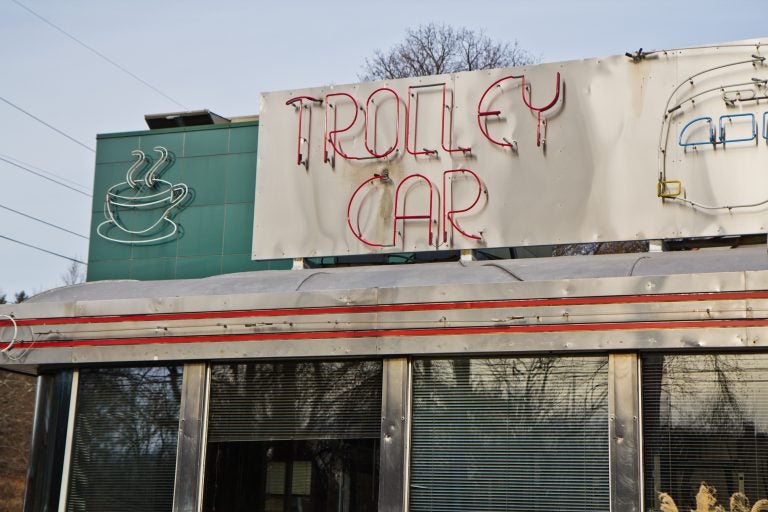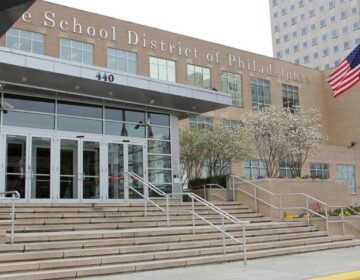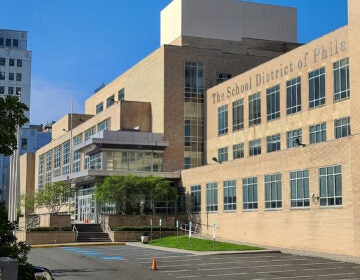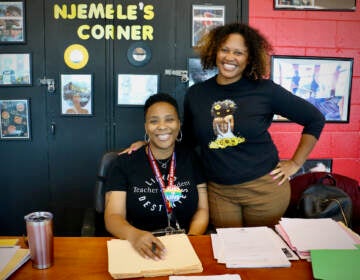Thanks to this program for teachers, a distinctive Philly diner will live on after its closure
For many, the Trolley Car Diner in Mount Airy was a beloved dining spot. But for some teachers, it was a lot more than that.
Listen 3:04
The Trolley Car Diner was a mainstay in Mt. Airy. (Kimberly Paynter/WHYY)
When developer Ken Weinstein opened the Trolley Car Diner in Northwest Philadelphia about two decades ago, he was more interested in community development than food.
“There wasn’t a whole lot on this stretch of Germantown Avenue,” Weinstein said, standing outside the diner’s former location on one of Mount Airy’s main arteries. “It was pretty desolate and empty.”
Weinstein thought the neighborhood needed a family restaurant, so he bought a 1952 stainless-steel diner from Wilkes Barre, Pennsylvania, and plopped it down in Northwest Philly. He added an old Philadelphia streetcar to the property for decorative effect, and a neighborhood institution was born.
The Trolley Car pumped out comfort-food classics until October, when increased competition caused Weinstein to close up shop.
“To the credit of the community, there are a lot of alternative places to eat — which is pretty wonderful,” said Weinstein. “It was our time. We had a great run, and I’m glad we did it.”
For the past decade, the diner also has run a small charity called the “Trolley Car Teachers’ Fund.” Using a combination of diner proceeds and personal donations, the fund distributed about $25,000 a year in small grants to local public school teachers.
When the diner closed last fall, it seemed the Trolley Car Teachers’ Fund might sunset, too.
But then, Weinstein said, teachers started reaching out.
“We heard from a number of teachers who pleaded with us to keep it going,” he said. “They rely on these small grants every year.”
And so Weinstein has pledged to keep the initiative afloat, even as the diner no longer brings in cash.
“To me, anyone can open a restaurant and serve food and hopefully do a good job with it,” he said. “But it’s another thing to step up to make sure the community in which you’re operating is taken care of.”
Since its inception, the fund has distributed about 500 grants of $500 or less.
That there’s demand for a program like this isn’t all that surprising. More than nine in 10 teachers say they spend out of their own pockets to outfit their classrooms, with the average educator plunking down $479 annually.
Websites like DonorsChoose have made it easier for individual teachers to raise money for supplies and other day-to-day expenses. But gaining access to philanthropic funds — the big bucks — can be tough.
Lots of teachers don’t have the wherewithal to write complex grant applications, much less the track record of success that major givers often want to see.
For many of those educators, the Trolley Car Teachers’ Fund has been a middle step between the worlds of self-funding and philanthropy.
The grant application, Weinstein said, is purposefully simple — designed to take 20 minutes or less. The fund’s committee approves about 80% of requests in an average year. It’s an initiative that revolves around the little things that may not seem so little to the average teacher: money for more books, a class trip, or a reading rug.
“It’s not small in the big picture of things,” said Ezechial Thurman, music technology teacher at Hill Freedman World Academy. “It gives you the courage to believe.”
Nine years ago, Thurman was starting anew at a Northwest Philadelphia elementary school after his prior school lost so many students it could no longer afford a permanent music teacher.
Thurman’s broad directive from his new principal was to start a music program from scratch.
“The gist of what I got was: We want the kids to love it, whatever you do,” Thurman said.
All Thurman had was an empty classroom — and a few ideas.
He asked the Trolley Car Teachers’ Fund for $500 to buy an audio interface — essentially, a device that “takes sound you’re creating in the moment and puts it in the computer.”
“The idea of recording and having the opportunity to actually make recordings in the classroom mattered to them,” he said. “They began to lean in on that.”
It was a breakthrough for Thurman, who has since gone on to record six studio albums with his students and earned citywide acclaim for the music program he runs at Hill-Freedman, a middle and high school in Northwest Philadelphia.
These days, Thurman can scoop up six-figure grants from donors who have heard of his program’s success. But so much of the momentum started with that $500 piece of equipment.
“At that starting point, you’re much more vulnerable,” said Thurman. “And you need someone to say ‘yes.’”
And those yesses will live on — even as the Trolley Car Diner rolls out of sight.
WHYY is your source for fact-based, in-depth journalism and information. As a nonprofit organization, we rely on financial support from readers like you. Please give today.





